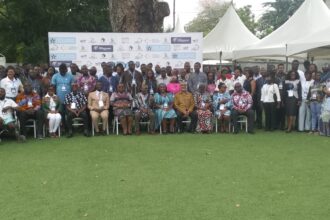Majority of people in the country live in rural communities and cover a high percentage of people with little or no formal education.
Development is anchored on human capital and rural communities are overflowing with raw human capital. The problem is not the capital but is in regard to how to harness the human resource to advance development.
Development Communication is an efficient way of using communication to generate development with the starting points both the ‘felt needs’ of community and the ‘action needs’ as identified and developed by the planners of development.
The main focus of development Communication is the dissemination of valuable and applied information on sanitation, health, agriculture and many more.
Such dissemination of information is done through the face-to-face technique of communication. Representatives of development planers or government travel from community to the community providing them with useful information on how new ideas and practices should be implemented through practical demonstrations.
The point is, dissemination of information empowers the people and when they are empowered, they are better positioned to participate effectively in decision making and chatter their own cause of development. The truth is that rural communities are interested in new ideas and practices in order to improve their living conditions, therefore, the local communities must first arrive at the problem definition and then its solution on their own so that there are no solutions to problems that are imposed on local communities from the outside. This will ensure continuity of practices that improve their living conditions.
Community participation and social action is the goal, and, feedback from the community is an essential means, therefore, there should be necessary and sufficient resources to enable the people to apply available new information to development activities key to their growth and progress. In every rural community, there are educated, intelligent and altruistic leaders within the communities who can motivate the masses to positive development-directed endeavours.
India is an example of countries that have successfully used Development Communication effectively in developing rural communities as well as increases the participation of the rural communities in governance. The country believed that the great mass of the illiterate and underprivileged rural population is a valuable development resource and that with the right communication interventions they could highly utilize the skills of the people to promote national development agendas.
The premise is that the individual rural family and the communities can be guided to the path of development if they were given practical knowledge. To achieve their developmental targets the government decided to decentralize communication to the community level through a team of multipurpose village-level workers supervised and coordinated by the block development officer. The multi-purpose village-level worker is the key communicator serving as a mediator between the rural elite and the government or the development partners.
In the case of Ghana, we could have Development Communication Officers at all district levels to perform such assignment to replicate India’s success story. This is a possibility in Ghana and can be implemented effortlessly provided the government or development partners are willing to adopt such strategies for the enhancement of enhancing community participation, the sustainability of democratic citizenship and socio-economic development of rural communities for the alleviation of perpetual poverty.
Source: Kuudaah Raymond
Development Communication Consultant














